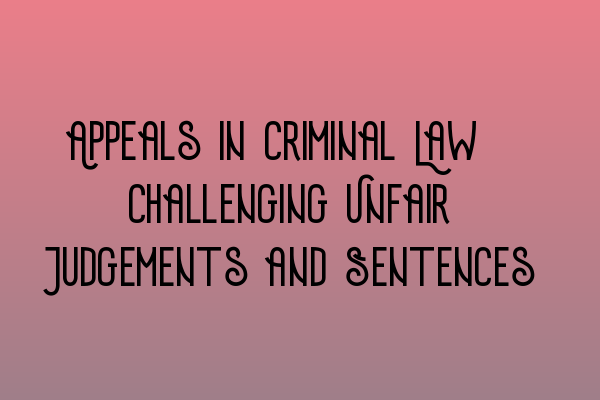Appeals in Criminal Law: Challenging Unfair Judgements and Sentences
Being accused of a crime can be a distressing and overwhelming experience. The criminal justice system is designed to ensure that individuals are treated fairly and justly. However, there are instances where unfair judgements and sentences are handed down. In such cases, appeals play a crucial role in challenging these unjust outcomes. In this article, we will explore the process of appealing a criminal conviction or sentence, the grounds for appeal, and the importance of seeking professional legal assistance.
The Process of Appealing a Criminal Conviction or Sentence
Appealing a criminal conviction or sentence is a complex and intricate procedure that requires a thorough understanding of the law and legal processes. It is advisable to seek the assistance of a qualified and experienced solicitor specializing in criminal law to navigate through the appeals process.
The first step in the appeals process is to file a notice of appeal. This document notifies the higher court that the individual intends to challenge the conviction or sentence. The notice of appeal must be filed within a specified timeframe, usually shortly after the conviction or sentence is handed down.
Once the notice of appeal is filed, the next step is to prepare a written submission outlining the grounds for appeal. This document presents the legal arguments and evidence supporting the claim that the conviction or sentence was unfair. It is important to have a strong and persuasive written submission to increase the chances of success.
After the written submission is prepared and submitted to the court, the case will proceed to the oral hearing. During the oral hearing, both parties will have the opportunity to present their arguments and counterarguments before the higher court. The court will carefully review the evidence, legal arguments, and the lower court’s decision before making a judgment.
Grounds for Appeal
There are several grounds on which an individual can appeal a criminal conviction or sentence. It is important to note that not all grounds for appeal may apply to every case, and professional legal advice should be sought to determine the most appropriate grounds for appeal. Some common grounds for appeal include:
- Errors in law: If there were errors in the interpretation or application of the law during the trial or sentencing, it may be grounds for appeal.
- Misconduct or irregularities during the trial: If there were instances of misconduct or irregularities during the trial that affected the fairness of the proceedings, it may be grounds for appeal.
- New evidence: If new evidence arises after the trial that could potentially change the outcome of the case, it may be grounds for appeal.
- Unreasonable or excessive sentence: If the sentence imposed by the lower court is considered to be unduly harsh or disproportionate to the crime committed, it may be grounds for appeal.
The Importance of Seeking Professional Legal Assistance
Appealing a criminal conviction or sentence is a complex and demanding process that requires a comprehensive understanding of the law and legal procedures. It is crucial to seek the assistance of a qualified and experienced solicitor specializing in criminal law to ensure the best possible chance of success.
A skilled solicitor will have the expertise and resources to thoroughly review the case, identify potential grounds for appeal, and develop persuasive legal arguments. They will guide you through each step of the appeals process, ensuring that all necessary documents are filed within the required timeframe and that your rights are protected.
Furthermore, a solicitor can provide you with invaluable advice and support, helping you make informed decisions throughout the appeals process. They will represent your interests before the higher court, present strong legal arguments, and handle any challenges or objections raised by the opposing party.
In conclusion, appealing a criminal conviction or sentence is a complex process that requires careful consideration and professional legal assistance. By seeking the guidance of a qualified solicitor specializing in criminal law, you can navigate through the appeals process with confidence and increase your chances of achieving a fair and just outcome.
Related Articles:
- Demystifying the Solicitors Qualifying Examination Format
- LLC Formation Made Simple: Step-by-Step Guide for UK Entrepreneurs
- Business Regulations in the UK: A Comprehensive Overview
- Ethical Considerations in UK Law: Upholding Professional Standards
- Preparing for the SQE Exam: Strategies and Resources for Success
